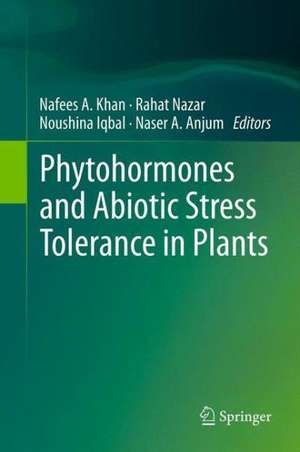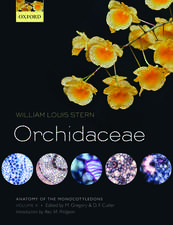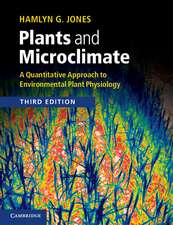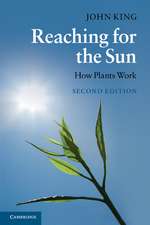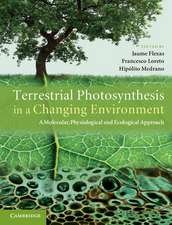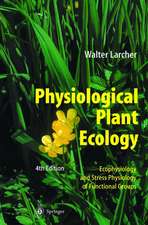Phytohormones and Abiotic Stress Tolerance in Plants
Editat de Nafees A. Khan, Rahat Nazar, Noushina Iqbal, Naser A. Anjumen Limba Engleză Hardback – 17 mar 2012
| Toate formatele și edițiile | Preț | Express |
|---|---|---|
| Paperback (1) | 945.79 lei 6-8 săpt. | |
| Springer Berlin, Heidelberg – 13 apr 2014 | 945.79 lei 6-8 săpt. | |
| Hardback (1) | 793.36 lei 38-45 zile | |
| Springer Berlin, Heidelberg – 17 mar 2012 | 793.36 lei 38-45 zile |
Preț: 793.36 lei
Preț vechi: 1043.90 lei
-24% Nou
Puncte Express: 1190
Preț estimativ în valută:
151.81€ • 158.50$ • 125.64£
151.81€ • 158.50$ • 125.64£
Carte tipărită la comandă
Livrare economică 31 martie-07 aprilie
Preluare comenzi: 021 569.72.76
Specificații
ISBN-13: 9783642258282
ISBN-10: 364225828X
Pagini: 300
Ilustrații: VIII, 308 p.
Dimensiuni: 155 x 235 x 28 mm
Greutate: 0.57 kg
Ediția:2012
Editura: Springer Berlin, Heidelberg
Colecția Springer
Locul publicării:Berlin, Heidelberg, Germany
ISBN-10: 364225828X
Pagini: 300
Ilustrații: VIII, 308 p.
Dimensiuni: 155 x 235 x 28 mm
Greutate: 0.57 kg
Ediția:2012
Editura: Springer Berlin, Heidelberg
Colecția Springer
Locul publicării:Berlin, Heidelberg, Germany
Public țintă
ResearchCuprins
Signal transduction of pytohormones under abiotic stresses.- Cross-talks on phytohormones signaling pathways under optimal and stressful conditions.- Phytohormones in salinity tolerance: ethylene and gibberellins cross talk.- Nitric oxide metabolism under environmental stress conditions.- Auxin as part of wound-healing response in plants.- Interaction between ethylene, auxin, light and microtubules during low-pH induced root hair formation in lettuce seedlings.- Cytokinin homeostasis.- Origin of brassinosteroids and their role in oxidative stress in plants.- Hormonal intermediates in the protective action of exogenous phytohormones in plants under salinity: A case study on wheat.- The role of phytohormones in the control of plant adaptation to oxygen depletion.- Stress hormones associated to sunflower germplasms with different sensitivity to drought.- An insight into the relationship between jasmonates and salicylic acid in salt tolerance.
Textul de pe ultima copertă
Plants are sessile and prone to multiple stresses in changing environmental conditions. Of the several strategies adopted by plants to counteract the adverse effects of abiotic stress, phytohormones provide signals to allow plants to survive under stress conditions. They are one of the key systems integrating metabolic and developmental events in the whole plant and the response of plants to external factors, and are essential for many processes throughout the life of a plant, influencing the yield and quality of crops.
This book summarizes the current body of knowledge on crosstalk between plant stresses under the influence of phytohormones, and provides state-of-the-art information on recent developments in understanding the role of phytohormones and abiotic stress tolerance in plants. It further provides information on how modulation in phytohormone levels affects the regulation of biochemical and molecular mechanisms.
This book summarizes the current body of knowledge on crosstalk between plant stresses under the influence of phytohormones, and provides state-of-the-art information on recent developments in understanding the role of phytohormones and abiotic stress tolerance in plants. It further provides information on how modulation in phytohormone levels affects the regulation of biochemical and molecular mechanisms.
Caracteristici
The book provides up-to-date information on the significance of phytohormones in tolerance to abiotic stress in plants It explores the mechanism responsible for the perception and signal transduction of phytohormones Written by experts in the field Includes supplementary material: sn.pub/extras
